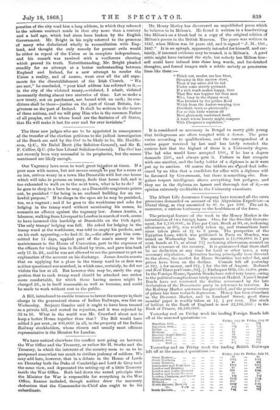Our Vagrancy laws seem to work great injustice at times.
If a poor man with means, but not means enough.to pay for a room at an inn, arrives weary in a town like Dunstable with but one house -which will take in persons on tramp, finds that house full, and is -too exhausted to walk on to the next town, what is he to do ? If he goes to sleep in a barn he may, as a Dunstable magistrate points .out, be punished "for being in an enclosed building for an un- lawful purpose." If he sleeps in the open air he may be punished, too, as a vagrant ; and if he goes to the workhouse and asks for lodging in the tramp ward without mentioning his means, be -commits an offence against the vagrancy law. James Austin, a labourer, walking from Liverpool to London in search of work, seems to have incurred this hardship at Dunstable on the 10th April. The only tramps' lodging was full. He asked for lodging in the tramp ward at the workhouse, was told to empty his pockets, and on his cash appearing,—he bad 3/. 2s.,—the officer got him corn- anitted for 14 days, applied part of the man's money to his maintenance in the House of Correction, part to the expenses of the officers for taking him to Bedford by train, and gave him back -only 11. 2s. 2d., and he was not allowed to see the governor to get an explanation of the account on his discharge. James Austin asserts -that on applying for a place in the tramp ward he at first was meither questioned nor searched, in which case, certainly, he did not -violate the law at all. But however this may be, surely the sug- gestion that to each tramp ward should be attached one rather more comfortable, for which those having means might be -charged 2d., is in itself reasonable as well as humane, and could be made to work without cost to the public.






























 Previous page
Previous page